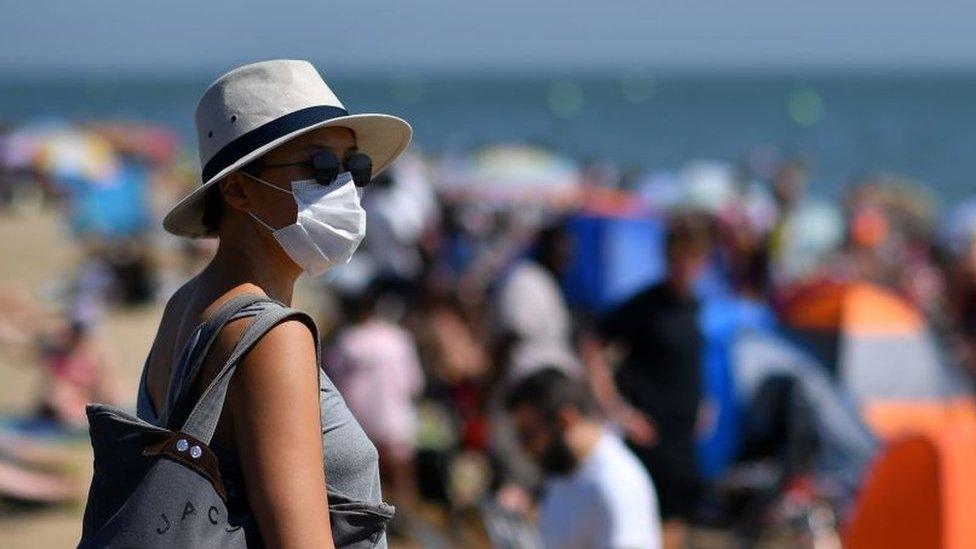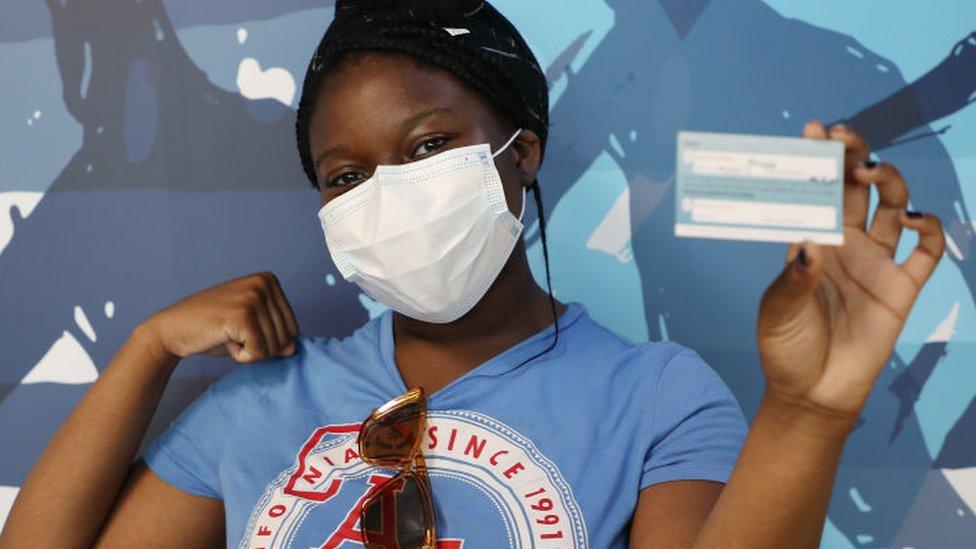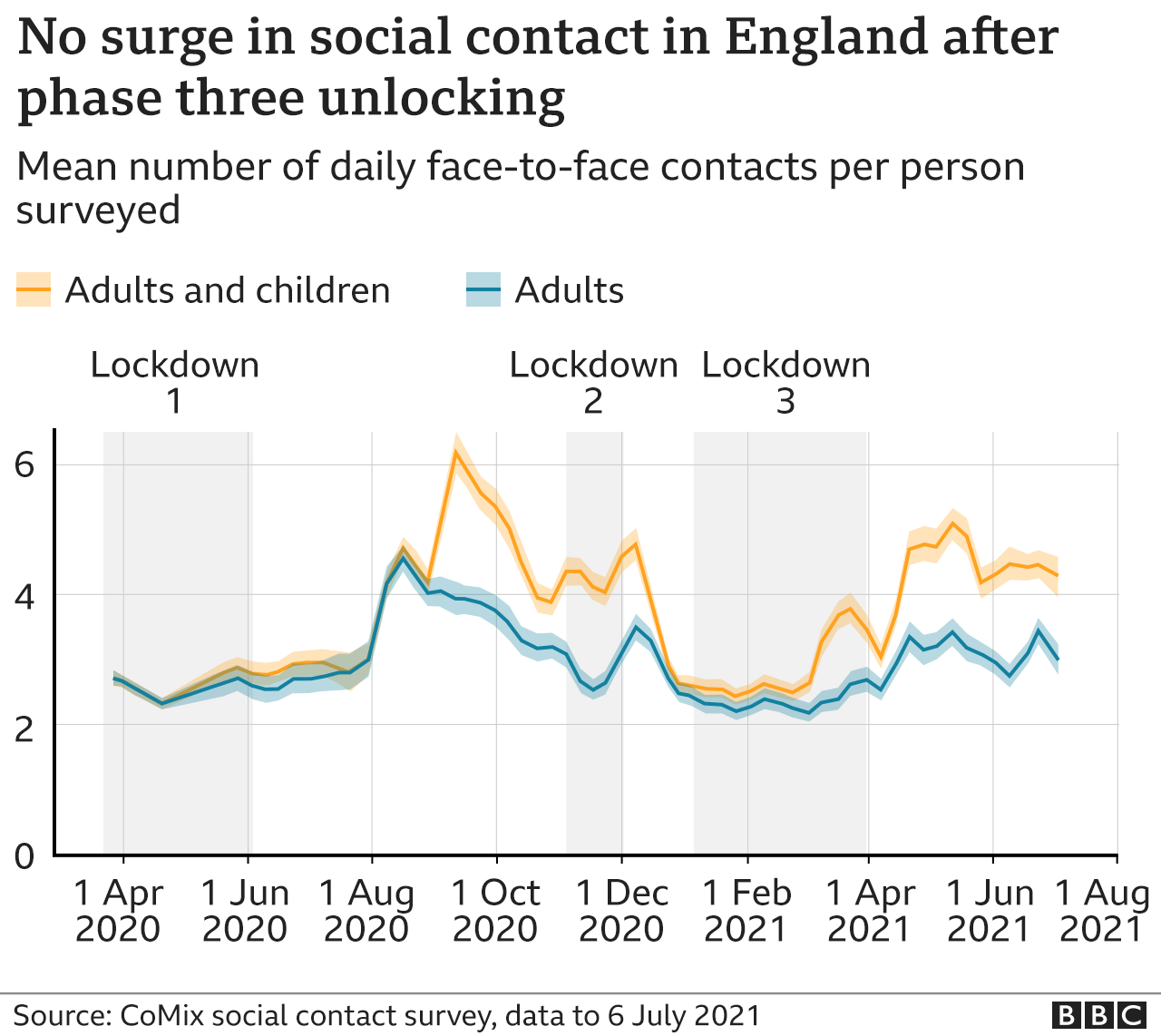Covid: Have we passed the peak and can we relax?
- Published
- comments

Who thought we would be here, now?
Like Olympic gold medallists, Tom Daley and Matty Lee, Covid cases in the UK are taking a spectacular dive.
The number of confirmed daily cases has fallen for six days in a row - now standing at 24,950.
It's little over a week since there were warnings we could reach 100,000 or even 200,000 cases a day. And unlike the previous two waves of Covid, it is happening without a national lockdown. Instead, we're opening up.
The turnaround is as surprising as it is welcome.
So is it really happening? Has the third wave of Covid turned the corner in the UK? And does it mean we can think about life getting back to normal?


As always with Covid, it's not quite that simple, and the challenge with spotting the peak is that it is hard to do while you're living it.
"It's certainly is good to see case numbers going down, but we need a reality check," Prof Christl Donnelly, from University of Oxford and Imperial College London, told me.
"We've had a dramatic increase - and then on the face of it, a dramatic decrease.
"We have to be careful not to over-interpret that."
Is Covid really in decline?
We don't know for sure what is going on, because there is always a difference between what can be measured in the data and what is really happening.
So figuring it out is like assembling a pandemic jigsaw where multiple pieces of evidence combine to give us the true picture.
A fall in laboratory-confirmed cases is only one (albeit major) piece in the jigsaw.
There is other evidence - the number of people being admitted to hospital, or studies conducted by the Office for National Statistics.
It is also useful to know how many people are infected - even if they don't have symptoms.
If any of those numbers start showing a fall as well, there will be more confidence that cases are truly coming down.
"I really want to believe we're turning the corner, but I'm hesitant until we have all the data," said Dr Mike Tildesley, from the University of Warwick.
Why might cases be falling?
There are high levels of immunity in the UK now, due to a combination of vaccines (70% of the adult population have had both doses) and people who have had the virus.
But we haven't reached "herd" (or "population") immunity - where so many people are immune that the virus struggles to spread.
If that happened, then the growth in cases would be expected to gently slow down, level off, and then case numbers will start to fall.
Instead, reported cases shot up dramatically and then fell equally precipitously. "It's unlikely that herd immunity could lead to that fast a transition," said Prof Donnelly.

So, is there some change in our behaviour - on top of immunity - that is more likely to have made the difference?
"For me there are two big ones: schools closing and an increased awareness of a growing epidemic - alongside nicer weather," Prof Adam Kucharski, from the London School of Hygiene and Tropical Medicine, said.
Summer holidays mean children mix less and parents don't congregate at the school gates.
Sunny weather means we can meet up with others outdoors, where the virus is less likely to spread.
And while restrictions are being eased, "residual caution" means many of us are still living well within the limits of the rules.
"There's constant news coverage reminding us we're in a pandemic.
"Contact levels post step-3 were far below normal - a third below pre-pandemic levels (of 10 contacts per day on average)," said Prof Kucharski.


Last year, all of this may have felt like tinkering around the edges. It has taken two full and draconian lockdowns to bring surging cases under control in the past.
But it is possible that sufficient immunity has put us into a place where the small things make the difference between cases going up or down.
It is also possible the Euros, with people watching the football in crowded pubs, led to a spike in cases - which then subsided.
Why might the cases data be wrong?
Six days' worth of data is only six days and we don't know what the coming weeks will show.
One nagging question is around the number of tests taking place and whether we're now "seeing less" of the pandemic.
The average number of tests that took place last week is down around 10% on the week before, although the number of cases has fallen even harder.
"After headlines about the 'pingdemic', I'm certainly aware of people turning the app off or not taking a test before a friend goes on holiday," said Prof Donnelly.
And schools closing also means children are no longer doing their regular rapid lateral flow tests.
Does Scotland hold a vital clue?
Evidence from Scotland may be telling us the fall is genuine, as the country appears to be further ahead in its third wave compared to the UK as a whole.
Different term times mean Scotland's summer holidays kicked in at the end of June.
The number of Covid cases then peaked on 1 July and - an extra piece of the jigsaw - the numbers being admitted to hospital peaked two weeks later too.


"What we've seen in Scotland, aligned with school closures, gives a plausible explanation for what's happening in the UK," said Prof Adam Kucharski.
"But I'd like to see another week or two before being confident."
So is it time to relax?
"We've not suddenly hit a magical point that means cases will only go down from now on," said Prof Donnelly.
"Being reassured is one thing, but being reassured and then less cautious would be unwise."

There are a couple of things happening right now.
We have not yet seen the impact of relaxing restrictions last Monday (19 July), which included reopening nightclubs in England.
This is due to the long delay between people catching the virus, and then getting symptoms and testing positive.
The end of this week is the earliest scientists expect to see the impact, but it could take longer as people may not have taken advantage of the relaxed rules until the weekend after 19 July.
Then there is the worry that people's behaviour shifts - as in the opposite of a self-fulfilling prophecy. The better we think things are going to be, the more we behave in ways that spread the virus and makes things worse.
Are we going to see 100,000 cases a day?
There was a point when 100,000 daily cases seemed to be on the cards.
We had passed 50,000, and cases still appeared to be rising rapidly.
"Hopefully we're moving away from that cliff - but we are still close to it," said Prof Kucharski.
"One of things you've got to remember is there is a lot of infection still out there. If behaviour changes, then you're only two doublings away from 100,000 (25,000 cases to 50,000 cases to 100,000 cases)."
Prof Donnelly said projections that high are now "less likely" to happen but warns we've still got a "lot of months ahead of us".
If cases are truly coming down then we're in a moment when the weather, schools and immunity are all in our favour. There is still uncertainty around autumn, when schools will reopen and people mix more indoors again.
But for now, it looks like we're in a better position than we've ever been.
Follow James on Twitter, external
